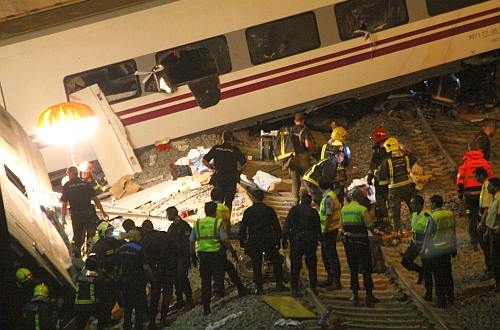Although the technical investigation now being carried out by CIAF, the body responsible for the investigation of railway accidents in Spain, will take several weeks, the government has recognised that the main factors behind the crash were driver error, and the lack of working ETCS equipment.
Speaking before the Parliament transport committee Pastor stated that a thorough inspection of the high-speed network is underway to indentify points where conditions similar to those behind the Santiago crash may occur.
This process will lead to the installation of conventional fixed signals indicating the maximum permitted speed, which were absent on the section of line where the accident occurred, and to the installation of Asfa balises to limit speeds on the approach to sharp curves.
The national automatic train protection (ATP) system was designed in the 1970s to protect trains from passing signals in danger, but will now also be used to enforce permanent speed restrictions at specific locations, such as the Santiago curve.
Pastor did not clarify, though, the reasons for the lack of functioning onboard ETCS equipment on the class 730 set which derailed in Santiago, nor the role that this could have played in the accident.
Trackside ETCS is operable on the Ourense – Santiago high-speed line, but Renfe class 730 sets operate exclusively on Asfa on this route even though they are equipped with ETCS, and operate under this system on the Madrid – Olmedo high-speed line.
Although the curve where the accident happened is not equipped with ETCS, the final ETCS balise on the high-speed line, located 4km from the crash site, would inform the driver (if ETCS is operational on the train) that the train is exiting an ETCS section, obliging him to acknowledge that situation and thus provide indirect information about the actual position of the train.
Trains operating on the Albacete – Alicante line, Spain's newest high-speed line, which opened in June, currently run exclusively on Asfa as ETCS is still being tested. Senior industry sources suggest that ETCS will be commissioned within the next few months, and point to the fact that the line was opened prematurely.
Other measures proposed by Pastor include tightening rules on the use of phones by drivers (an incoming call could have been a contributing factor to driver error in this case), and improved ticketing and passenger counting systems.

